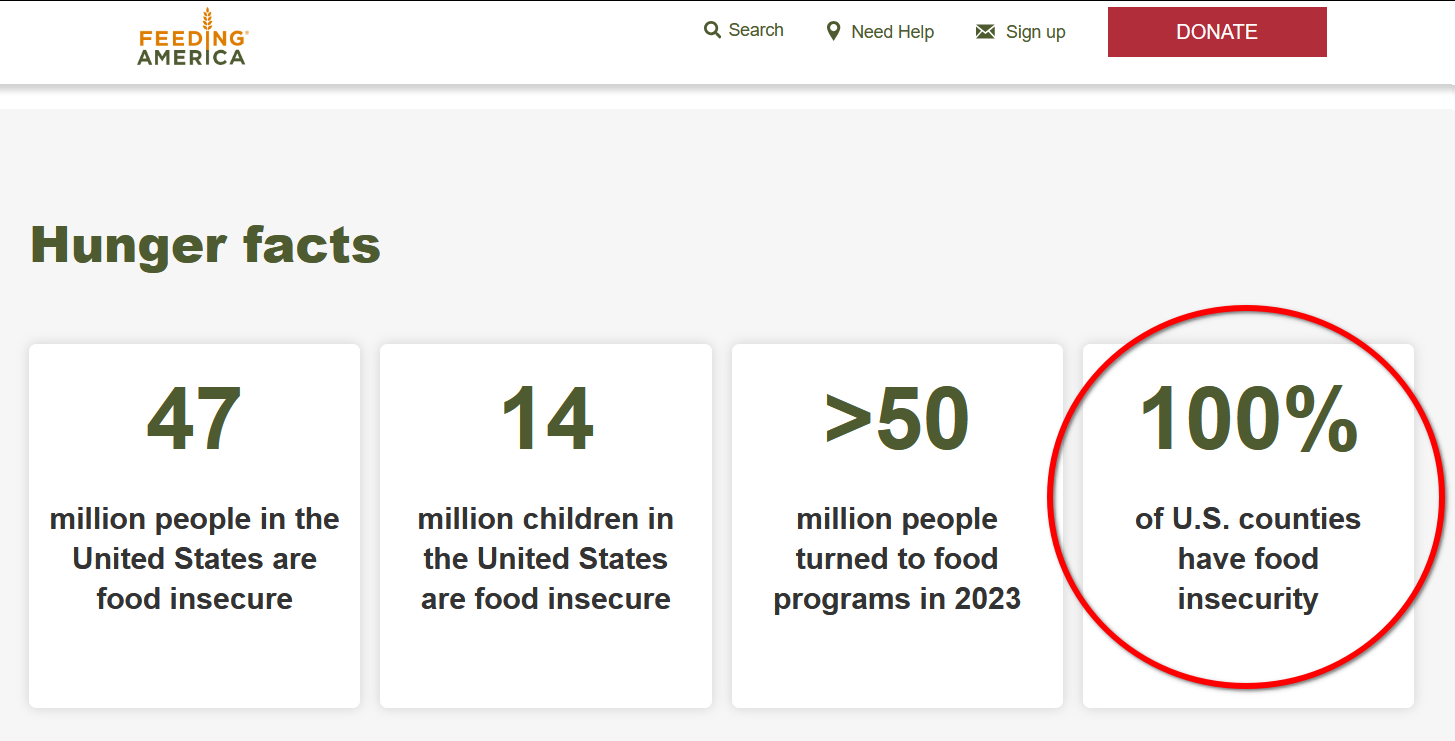
Let’s talk about it.
Have you ever been so hungry that your stomach actually hurt? Have you ever been so desperate for a morsel of food, that you’d be willing to kill for it? Have you ever been so deprived of sustenance that you lost your civilized mind and once again became an animal driven by the instinct to survive?
Chances are, probably not.
Personally, I have made the discipline of fasting part of my life’s journey. I have fasted many times, sustaining on nothing but water for 6 to 10 days, or more—and even at that, I’ve never felt that sort of hunger or desperation. Perhaps that’s why my mind has been chewing on all the commercials and advertisements that come with this time of year, put out by organizations that are begging for support to “feed the community.”
There’s something there.
I know it may seem callous, and it may even be off-putting to question the sincerity of these programs, especially this time of year, but something just doesn’t sit right. There are hundreds, if not thousands of organizations working across the country (and all around the world), ostensibly working to feed the millions of people who, for whatever reason, appear incapable of feeding themselves.
That’s great.
But with all of this time and effort being invested, with all of the food donations, all the financial support and the countless volunteer hours, why does the problem seem to be getting worse? With all of the nonprofits, global NGOs, and direct government funding, why is “hunger” such a sustained and growing problem?
Are you aware that we are facing a “startling hunger crisis” in America today? Did you know that according to government reports, there has been an “alarming rise” in hunger in recent years? Consider the damning headlines:
The 2024 USDA Food Security Report: An Alarming Rise in Hunger
USDA Food Security Report Highlights Startling Hunger Crisis in America
Millions of families in the U.S. experience food insecurity, NPR report
Sounds terrible, right?
According to Feeding America, the problem is so bad that 100% of counties in the United States are struggling with “food insecurity,” more than 47 million Americans are currently facing hunger, and, allegedly, 1 in 5 children aren’t getting enough to eat.
As a brief aside, it’s worth noting this do-gooder organization claims that “inequality” is a “root cause of food insecurity,” specifically because of the “long history of racism and discrimination in the United States.” Keep that in mind.
When you think about the “hunger stats that shame America”—to quote Newsweek— how does it make you feel? When you hear about children going hungry or not having access to food, how does it make you feel? When you see the bloated bellies of starving children in Africa, how does it make you feel?
Chances are, as a human being hard-wired for empathy, when confronted with images of starving children, you feel sympathy. When you hear about kids going hungry right here in America, you feel sympathy. With every radio ad, fundraising letter, and public service announcement begging for your support, you feel sympathy.
This is not by accident.
I’ve covered the insidious nature of sympathy, as it relates to emotional manipulation, in several prior reports. In a nutshell, according to psychologists, provoking sympathy promotes “prosocial” behavior. By pushing our biological buttons, the mind becomes primed for “embedded social consciousness,” which cultivates a socialist impulse.
** I want to emphasize that there is a hard science to this, as documented here:
THAT SAID, it feels prudent to contrast this narrative of a “startling hunger crisis” with the most recent data released by the CDC, which indicates over 20% of adults in America are now obese. Worse yet, in nearly half the states in our nation, the obesity rate is actually over 35%, meaning that 1 in 3 people are grossly overweight.
Tell me: how does that data reconcile with the “hunger that shames” America?
How are we to make sense of the discrepancy?
Could it be there is something else going on here?
Let’s zoom out.
It can be difficult to disarm sympathy. Sympathy makes us feel good about ourselves. It makes us feel like good humans, and it makes us feel superior in some subtle ways. Beyond that, as with all other emotions, sympathy can become addicting.
The never ending and increasingly bizarre crusades of social justice warriors provides a prime example. These well-meaning morons have been taught to create injustice in their minds, which stimulates sympathy and fuels their sense of moral superiority. It’s a head trip, but in their emotionally charged world, the injustice is real.
It’s real because they can feel it.
They feel the sympathy, whether it’s legitimately warranted or not.
This emotional displacement of reality is something that we all have to deal with as humans. It can be tricky, because our emotions are real. The emotions we feel are molecules being released into the blood stream, so we cannot help but feel them.
BUT, the stories that are stimulating the emotions may or may not be real.
That means our emotions may or may not be rooted in reality. The feelings we experience may be real, but the emotion may be based on false assumptions, provocative propaganda, or flat out lies. Unfortunately, it is precisely this sort of false emotion—feeling a certain way about something, based on false information—that the masters of manipulation seek to exploit.
Hence the cunning use of so much sympathy in socialist propaganda.
Which brings me back to the starving children.
Are there really millions upon millions of starving children in America? Really?
More broadly, is there really an alarming hunger crisis in our largely obese nation?
Or, could it be that this narrative is being used for a more nefarious purpose?
Rationally speaking, even though we’ve been completely inundated with coordinated public messaging campaigns compelling us to donate here, there, and everywhere; even though everywhere we turn we are being told there are people in need, who desperately need our help; even though this time of year we find our heart strings getting yanked in so many different directions, we should still be curious enough to ask: what’s this really all about?
Something doesn’t add up.
IF there are so many hungry people, WHY?
Why, if there are so many different government programs, school programs, church programs, corporate programs and nonprofit programs, is there a hunger crisis? Why, if there has been a sustained global effort to reduce hunger all around the world for decades, has it only gotten worse? What the hell is going on here?!
Globally speaking, the United Nation’s World Food Program tells us that some 25,000 people starve to death each day, and that 9 million people die every year from hunger.
Just as Feeding America claimed the root causes of the hunger crisis in the United States are inequality and systemic racism, the United Nations goes on to excoriate the bourgeois, essentially blaming global starvation on heartless, greedy, capitalist pigs:
“There is 400 trillion dollars’ worth of wealth on the earth today, and the fact that 9 million people die from hunger every year… Shame on us.
In the height of COVID, billionaires’ net worth increase was $5.2 billion per day. At the same time 24,000 people die per day from hunger... Shame on us.
Every hour the net worth of billionaires during the height of COVID was a substantial $216 million per hour. Yet 1000 people per hour were dying from hunger… Shame on us.”
The moral of the story here is the need for a socialist redistribution of wealth, in case that wasn’t clear. Do you think it is just a coincidence that these organizations are all harping on the same narrative, screeching that inequality is the root cause of food insecurity? Do you think they just made that story up themselves?
I believe there is something else going on here.
Think about it: what is the opposite of “food insecurity”?
ANSWER: food security.
But what is “food security” anyway — and how might it be obtained?
When the globalists use the word security, think control. This is the commie tactic of using words with a “hidden, higher meaning” that is opposite of what’s being said. Thus, properly translated, “food security” means control over the food supply.
That’s how they plan to “secure” all the food.
This is why the UN called on world leaders “to make food security a reality for all,” for the purpose of building a “healthier planet through better food systems.”
Note how controlling the food supply (i.e. food systems) has been connected with saving the planet. This is a central pillar in their plan for total global control.
Control the food supply, control the peasants. Period.
Of course, they’ve been selling this plan for decades, as if it’s necessary and for the greater good, skillfully preying upon human sympathy to elicit public support to “feed the world”—and the majority of people have bought it hook, line, and sinker.
Strategically speaking, years of localized propaganda and cyclical sympathy campaigns have been steadily building public support for the broader agenda.
Ultimately, I believe the agenda is a money laundering operation that funds socialist policies at the national and subnational levels. These policies, currently packaged as the UN Sustainable Development Goals, are designed to give governments control over the food supply (and every other aspect of our lives).
Those promoting this scheme mentally justify it in two ways:
They believe that only the government can feed all the poor people on the planet.
They believe the government must save the planet by enforcing “sustainable” diets.
The first premise stands in service to the second. The global elites don’t care so much about starving people, they care about controlling the food supply to save the planet. They use the starving people to elicit the emotional support for the overarching scheme, which is reducing and controlling the human population.
Says the World Food Program Executive Director, David Beasley:
“If we’re struggling today to [feed] the 7.7 billion people, imagine having 10, 11, 12 billion people on earth.”
Remember, in their own words, they are trying to “proportion” the population, and they’re convinced they “just don’t need” the majority of meat-eating peasants.
This is the Anti-human Agenda.
In the twisted minds of the global cabal, “better food systems” will lead to a “healthier planet.” Having a healthier planet necessarily means reducing the population and controlling the food supply. This is all part of Earth System Governance, for the record, but the underlying thrust is eugenics and depopulation, I assure you.
“…if everybody in the world consumed resources at the rate people in the United States, we would require the equivalent of more than five earths to satisfy their needs.”
—UNICEF
As we gather to feast with friends and family for Thanksgiving this year, we should be grateful for the abundance in our lives. We should be thankful for the little things, relish the completely unsustainable indulgence, and enjoy it while it lasts.
If the globalists get their way, we won’t be feasting for long.
Enjoy your celebrations, and remember:
RESIST WE MUST!!


















